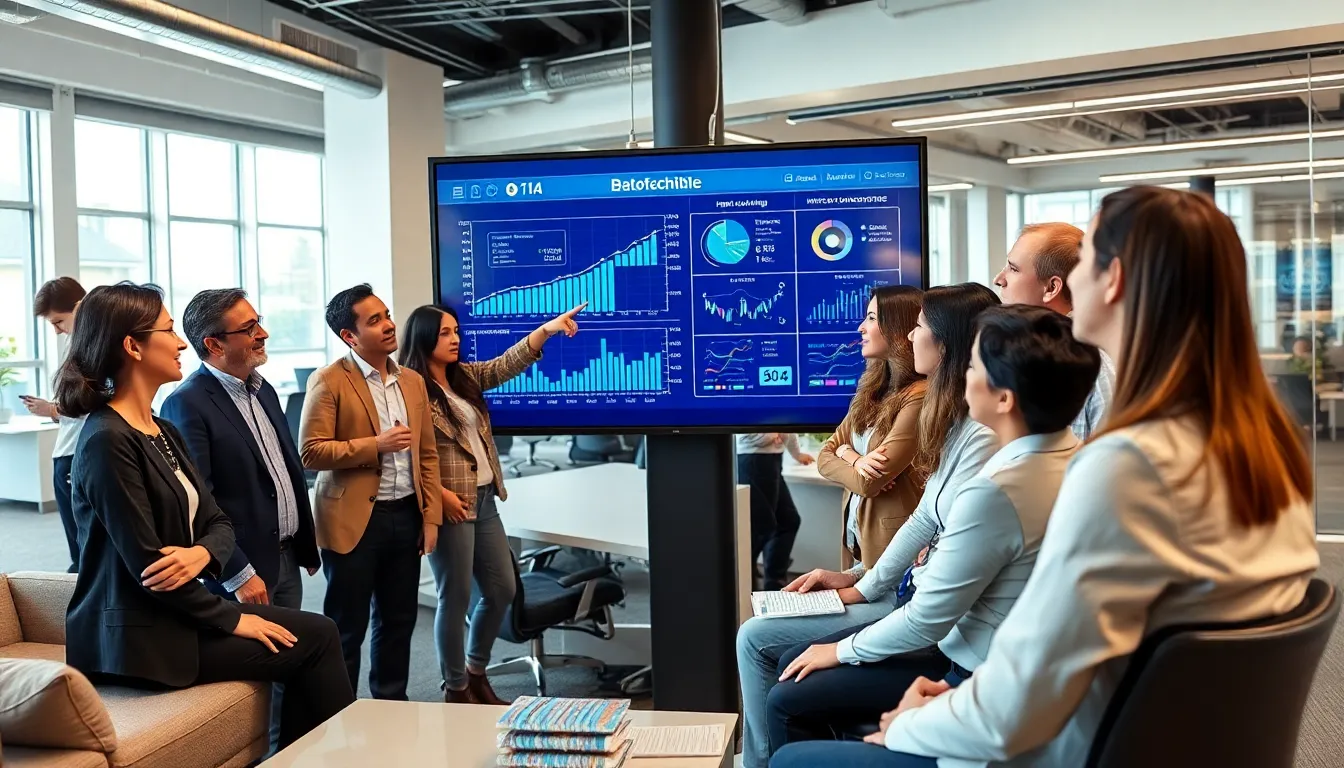In today’s world, the tech-driven economy is like a rollercoaster ride—thrilling, unpredictable, and occasionally leaving you with a queasy stomach. As technology reshapes how businesses operate and consumers engage, it’s clear that embracing this digital revolution is no longer optional. Companies that adapt will thrive, while those stuck in the past might as well be using a flip phone in a smartphone world.
From artificial intelligence to blockchain, innovation is the name of the game. It’s not just about having the latest gadgets; it’s about leveraging them to create value and drive growth. So buckle up and get ready to explore how the tech-driven economy is transforming industries, creating jobs, and even redefining what it means to work. After all, who wouldn’t want to ride the wave of progress while sipping a latte at their virtual office?
Table of Contents
ToggleOverview of Tech-Driven Economy
A tech-driven economy thrives on innovation and technological advancements. Businesses leverage software and hardware solutions to enhance productivity and streamline operations. For example, artificial intelligence tools can automate routine tasks, allowing employees to focus on strategic initiatives.
Today, industries across sectors experience significant transformations. The finance sector embraces blockchain technology for secure transactions and enhanced transparency. Retailers use data analytics to tailor customer experiences and optimize inventory management.
Job creation remains a crucial aspect of this economy. Emerging roles in data science, cybersecurity, and software development support growth and adaptability. Companies invest in upskilling their workforce to meet evolving demands.
Moreover, consumer behavior shifts in response to new technologies. Individuals expect seamless online experiences, driving businesses to enhance their digital interfaces. Smart devices and the Internet of Things provide users with greater connectivity and convenience.
Economic growth closely relates to the adoption of these technologies. Countries that foster a tech-driven environment often see increased productivity and competitiveness in global markets. Investment in research and development plays a vital role in maintaining this edge.
Regulatory frameworks also influence the tech-driven economy. Governments adapt policies to support innovation while addressing challenges like data privacy and cybersecurity. Collaborative efforts between public and private sectors can lead to balanced solutions that benefit society.
Embracing this economy fosters resilience and adaptability. Businesses equipped with advanced technologies can navigate uncertainty and respond to market changes swiftly. A future shaped by tech-driven principles offers vast opportunities for those willing to innovate and evolve.
Key Characteristics of a Tech-Driven Economy

A tech-driven economy embodies key traits that define its landscape. These characteristics foster growth, innovation, and adaptability within industries.
Innovation and Technology Adoption
Innovation plays a vital role in a tech-driven economy. Organizations frequently adopt new technologies to improve efficiency. AI and machine learning tools enable businesses to automate processes, increasing productivity and reducing costs. Early adopters gain a competitive edge by leveraging data analytics for informed decision-making. Companies across various sectors continually invest in research and development, ensuring they remain relevant in fast-changing markets. Workers engage with new technologies, enhancing their skills in line with industry demands. Embracing these innovations opens pathways to new business models and revenue streams.
Digital Infrastructure Development
Robust digital infrastructure underpins a tech-driven economy. High-speed internet accessibility remains crucial for both businesses and consumers. Cloud computing facilitates seamless data storage and sharing, promoting collaboration. Platforms enabling e-commerce empower businesses to reach global markets. Investment in cybersecurity protects sensitive information, fostering consumer trust. Smart city initiatives drive urban development, integrating technology into everyday life. Governments play an essential role by creating policies that support infrastructure upgrades and digital equity. Overall, a strong digital foundation paves the way for sustained economic growth and innovation.
Impact on Industries
Tech-driven economy significantly influences various industries, propelling them toward modernization and enhanced efficiency.
Transformation of Traditional Industries
Traditional industries such as manufacturing and agriculture undergo substantial transformations through technology. Robotics streamline production processes, increasing output and minimizing errors. IoT devices enable farmers to monitor crop health in real-time, optimizing resource usage. Data analytics provides insights into market trends, allowing businesses to make informed decisions. Moreover, augmented reality assists in training employees, enhancing safety and operational efficiency. Companies that embrace these technologies often experience improved profitability and competitiveness in their sectors.
Emergence of New Sectors
New sectors rapidly emerge from the tech-driven economy, reflecting the shifting landscape of employment and innovation. For instance, the gig economy thrives, offering flexible job opportunities in areas like ride-sharing and freelance services. Cybersecurity has become crucial as businesses prioritize data protection, creating demand for specialists in this field. Health tech also flourishes, with advancements leading to telemedicine and wearable health devices gaining popularity. E-commerce continues to grow, reshaping retail, with online shopping becoming a preferred consumer experience. This evolution fuels job creation and encourages entrepreneurial ventures across diverse markets.
Economic Implications
The tech-driven economy reveals significant trends, affecting job markets and productivity levels in numerous ways.
Job Creation and Workforce Changes
Emerging job roles are a direct result of technological advancements in the workforce. Data science, cybersecurity, and software development positions experience substantial growth, addressing evolving industry demands. Companies invest in upskilling initiatives, ensuring employees gain necessary skills for new technologies. Furthermore, gig economy opportunities are on the rise, offering flexible employment options. Traditional roles transform as automation and AI become integrated into daily operations, necessitating a shift in workforce competencies. Adapting to these changes creates a dynamic labor market that values continuous learning and innovation.
Productivity and Efficiency Gains
Enhanced productivity results from implementing advanced technologies across industries. Automation tools reduce time spent on repetitive tasks, allowing employees to concentrate on strategic initiatives. Organizations see operational efficiencies as AI and data analytics optimize workflows and improve decision-making processes. In finance, blockchain technologies streamline transactions, reducing errors and increasing security. Retailers leverage advanced analytics to personalize consumer experiences, fostering customer loyalty. As businesses embrace digital solutions, growth rates increase, leading to a more competitive environment. Overall, the tech-driven economy prioritizes efficiency and innovation, enhancing output across sectors.
Challenges and Considerations
Tech-driven economies face several challenges that require careful consideration. Key issues include data privacy and security, as well as accessibility in the digital landscape.
Data Privacy and Security Concerns
Concerns over data privacy dominate discussions regarding technology adoption. Organizations gather vast amounts of data, raising questions about how this information is stored and used. Consumers often worry about data breaches, which can lead to identity theft and financial loss. Regulatory compliance becomes critical, as governments enforce stricter laws on data protection. Blockchain solutions offer potential enhancements in security measures, ensuring transactions remain secure. Companies must prioritize robust security protocols to maintain consumer trust.
Digital Divide and Accessibility Issues
Accessibility issues significantly impact the growth of tech-driven economies. Not all populations enjoy equal access to advanced technologies, creating a digital divide. Individuals in rural areas or low-income communities often lack reliable internet connections and modern devices. This disparity prevents many from fully participating in the digital economy. Solutions such as community broadband initiatives aim to bridge the gap, fostering inclusivity. Governments play a vital role in promoting policies that enhance digital access for marginalized groups. Addressing these challenges paves the way for broader economic participation and innovation.
The tech-driven economy presents both exciting opportunities and significant challenges. As businesses adapt to rapid technological advancements they must prioritize innovation and workforce development. Embracing these changes not only enhances productivity but also fosters a culture of resilience and adaptability.
However addressing issues like data privacy and digital accessibility is crucial for ensuring equitable participation in this evolving landscape. By investing in robust infrastructure and inclusive policies governments can play a pivotal role in shaping a sustainable tech-driven future. Ultimately those who embrace this transformation will find themselves at the forefront of economic growth and innovation.




